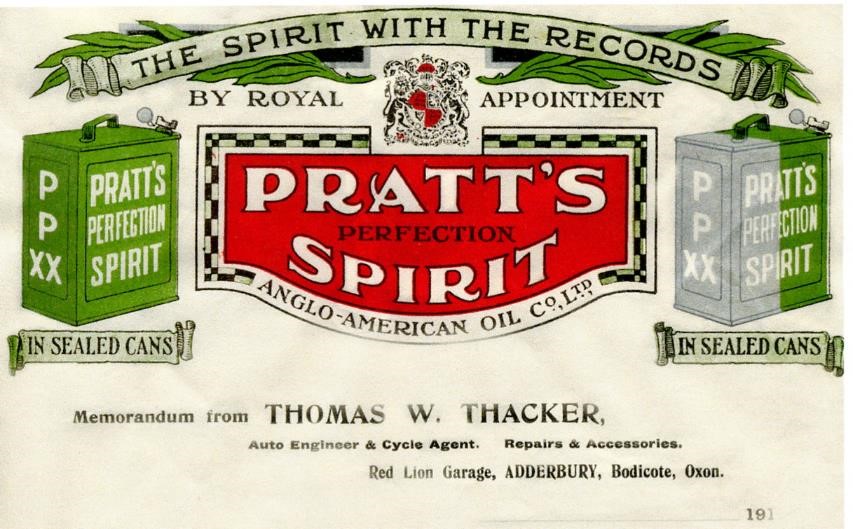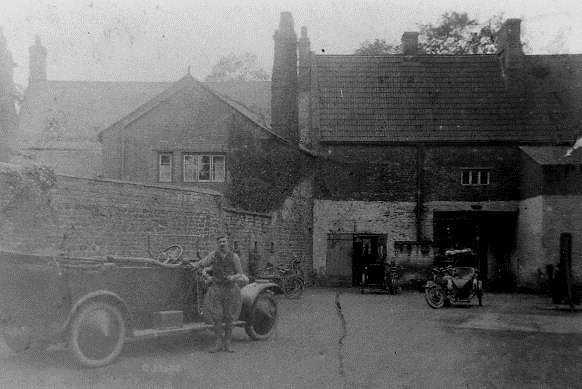The Garage

I suppose I must have been about three years old when we moved to a cottage on the main road a few yards opposite was what was known as Tommy Thacker’s Garage and it is one of my earliest memories. The House was at one time thatched. I used to watch the swallows as they disappeared into their nests under the eaves to feed their young. They came back about the same time every year.
Thomas William Thacker, born 1886 was the son of Thomas Thacker farrier and blacksmith and his wife Fanny. According to the 1901 census at the age of 15 he was living with his parents, sister Minnie aged 11, brother Rowland. aged 8, and sister Kathleen aged 3. All the family were living at Bodicote although they seem to have originated from Rickmansworth in Hertfordshire. In January or February 1911 aged 24 he married, Edith Maude Clarke daughter of Joseph Clarke from Emscote Warwickshire. She was age 34.

On the 1911 census Tommy was listed as a cabinet maker working at Stone’s box factory in Banbury and living at Frog lane Bodicote. Their only son William was born in December 1911. For what must have been a few years Tom had a cycle repair shop in the yard at the back of the Red Lion. It is not known if it was a full or part time business and it seems to have closed during the first world war. It is not certain if he was in the army in WW1. There are two listings of a Thomas William Thacker serving in the R.A.S.C. but neither may be him. He probably set up the garage business in the early 1920s and it about 40years.
I seem to remember Mrs. Thacker as a short slightly stocky lady. She always wore her hair in a bun with a flowered overall over an assortment of cardigans according to the weather. She was a very hardy person and every morning, about eight or earlier, we would hear the clonk of metal as she unlocked the doors of the petrol pumps. Petrol was dispensed by winding a handle. When a gallon had been pumped through, then the handle was wound back ready for the next gallon. It was possible to move a clip if only half a gallon was required. A dial face showed a count of the sales. The hose would swing out over the car much as they still do today.
I never recall either of them leaving the premises or joining in any village affairs, except maybe for Mrs. Thacker popping the few yards down to the Co-op. At that time there was a milkman, baker, butcher and fish man who came round from door to door. I remember she would talk to my Mother whenever we were passing. They were very proud of their son who, after University went abroad collecting antiquities from Egypt and the far east. Later he was appointed as a professor of Hebrew and Oriental Languages. Many of his finds are displayed in a special room called Thacker’s room in the Oriental Museum belonging to Durham University. There he became a teacher creating a school of study and a research centre for the study and teaching of not only the language and literature of these countries but their culture. In March 1939 Bill married Kathleen Hawthorn. They had one son and lived at 28 Church Street Durham. Bill died in April 1984.
I seem to remember Tom as a tall well spoken man. He had a small moustache and a stiff leg which I think was due to rheumatism. At one time the family adopted a stray black dog and Tommy walked it down Long Wall twice a day and he said the walking helped his bad leg. Each morning he would be seen rolling back the large door that housed his workshop. There were several small windows along the top of the door. Inside was his work bench, tools and a miniature hardware store, spare tyres and inner tubes for bicycles, puncture outfits, small tins of oil and black enamel for domestic use, sticky tapes, screws, bolts (on which he could make and cut a thread and find a nut to fit) and nails. In fact he kept anything that would save a trip into Banbury.
Out in the yard there was a building where he kept large drums of paraffin which he sold by the gallon and at some time he set up a machine to charge car batteries and accumulators which were needed to power early wirelesses. Large bottles of acid were needed for this purpose and one had to be very careful when carrying the accumulators home. Spills could burn skin or holes in clothing; most had a carrying handle. There was a black and a red cap on the top to loosen to attach the connectors for charging.
All the repairs for cars and cycles were done on the footpath at the front of the building. He had what was known as a sledge made from slats of polished wood with a leather headrest and mounted on wheels. It must have been painful for Tom at times with his stiff leg to lie on it and lever himself underneath the cars.
During the WW2 one of the petrol pumps was taken over by the army. With just the handle to work the pump it took quite some time to fill up the big army lorries and bren gun carriers. One day we saw some of the highland division lorries filling up. They were on their way to the second front. The soldiers were all sitting under our garden wall waiting and we took them cups of tea.
Cars were a magnet for all the young lads and they could be seen peering under the bonnets when one was being attended to. Tom often chose one to help him on Saturdays and school holidays. The last one I remember was Bernard Locke the policeman’s son. A low wall divided the yard from the footpath in front of the pumps and was a regular meeting place for a group of young chaps on Sunday afternoons when the garage was closed. I never heard of them doing any damage they just used to sit and smoke their woodbines.
Although I cannot say we had a personal relationship with the Thacker’s my mum and dad used to talk to them a lot.
Tom once gave my small son a wooden replica of a lawnmower painted green and red, perfect in detail except I do not think the curved blades would have actually cut grass. My son loved it he called it his mowlawner. He was also very interested in clocks and had a collection of coins which sadly were stolen when there was a break in during the early 1950’s, something I believe he found hard to get over
Not long after we were married they gave us two big comfortable easy chairs. As we moved away we still heard their news from my parents. Edith died on December 18th 1961 aged 85. I do not think Tom did much afterwards and eventually went to live with his sister. A near neighbour used to bring him back from time to time. Tom died on February 14th 1973. He and Edith are remembered with a grave stone in Adderbury Cemetery.
Rhoda Woodward
